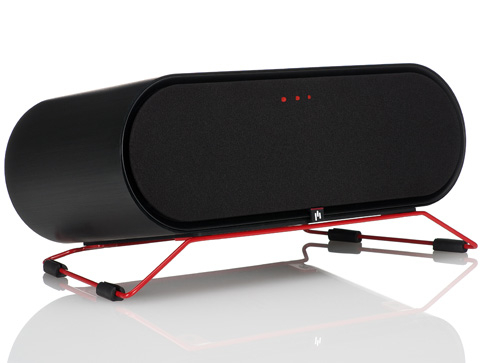Aperion Audio Intros Network Speaker for Windows
This wireless speakers allows users to listen to music anywhere there's a home network connection.

Aperion Audio sent over a press release announcing its new Aperion Aris Wireless Speaker for Windows. The gadget connects to the local network via a wireless or Ethernet connection, and pulls music from a desktop or laptop running Windows 7. Unfortunately, it doesn't come cheap, costing a meaty $499 which includes the Aris Wireless Card for Windows.
"The ARIS Wireless Speaker combines our experience in making wireless speaker systems with the media capabilities of the Windows operating system," says Mike Hopkins, Product Development Manager at Aperion Audio. "The result is effortless listening from any room. Plus, with the new ARIS app, smartphone users can choose music from any device on their network and instantly send it to any connected Aris speaker."
Aperion says the speaker can quickly connect to a home network with the push of a button using Wi-Fi Protected Setup. The "Play To" feature in Windows 7 allows users to send music from any device on the network to an Aris speaker located where they want to listen.
According to Aperion, key features include a single-piece brushed aluminum enclosure (6.5 inches high by 14.75 inches wide), an adjustable and removable steel base, and six internal speakers consisting of four powered drivers and two passive radiators. Overall it has a total power of 100w RMS.
"Most people today store their music on a variety of digital devices, including desktops, laptops, notebook PCs, network storage drives, tablets and smartphones. These devices are usually on the home network, but users can listen to music only on a device that is physically plugged into a powered speaker or stereo system. The ARIS wireless speaker eliminates the need to move music files between devices or plug and unplug cables to hear specific tracks."
Other features include three sound modes (natural, bass boost and enhanced stereo), and DLNA support. Windows 8 support is still pending, but the company mentioned that it should work with Windows 8 Consumer Preview.
Pre-orders will be accepted starting May 8, 2012, and the system is expected to ship mid-June 2012. The one-year limited warranty covers all defects in material and workmanship, Aperion said.
Sign up to get the BEST of Tom's Guide direct to your inbox.
Get instant access to breaking news, the hottest reviews, great deals and helpful tips.
Kevin started taking PCs apart in the 90s when Quake was on the way and his PC lacked the required components. Since then, he’s loved all things PC-related and cool gadgets ranging from the New Nintendo 3DS to Android tablets. He is currently a contributor at Digital Trends, writing about everything from computers to how-to content on Windows and Macs to reviews of the latest laptops from HP, Dell, Lenovo, and more.
-
How about making something like an Aiport Express (that outputs to a real amp) but that appears to Windows as just a speaker output, so that you can use any application to send audio to anywhere in your house?Reply
-
razor512 for much less money, you can but a decent 2.1 logitech speaker system, and a $200 android tablet, and have a rather nice network audio and video device for under $300Reply
PS android also allows network audio playback initiated by a pc via wifi, or bluetooth -
__Miguel_ They might be good speakers, but $500 for a DLNA-compliant 2.0 device? That's way too steep, IMHO...Reply
CryoEngineerHow about making something like an Aiport Express (that outputs to a real amp) but that appears to Windows as just a speaker output, so that you can use any application to send audio to anywhere in your house?That's probably a Windows driver stack limitation, Windows was never developed with that in mind, though you can have that with Linux almost out of the box, if memory serves me right - Linux has had network sound redirecting capabilities to other Linux boxes for years, you just need the right software.
However, you can probably have that now if USBoE (USB over Ethernet) for Windows has made progresses, since that way you can share a USB sound controller over the network.
USBoE, if memory serves me right, started as a Linux project that has a Windows client, so you can conceivably have a bunch of tiny Linux-based machines with USB sound controllers attached acting as Windows sound devices. Not sure if ARM is a target of the USBoE drivers, but with a bit of fiddling I guess you could actually have minute self-contained network plugs for speakers.
